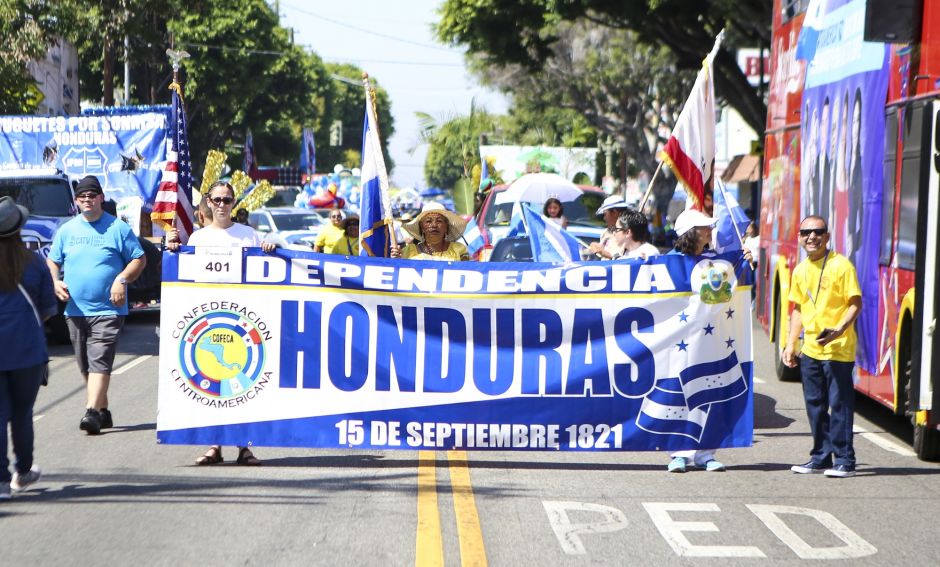The injustices against immigrants are what motivate the activist to keep fighting

The sadness of looking at thousands of his Honduran compatriots who have not been able to see their families for years was the reason why Leoncio Velásquez decided to start a lifetime in social activism.
“I watch how they fight here, and although their children were born in the United States they cannot solve the immigration situation,” says this character, president of the United Honduran Los Angeles (HULA) organization.
Through this organization, Velasquez has advocated for his countrymen to defend at local, state and national level the extension of the Temporary Protected Status (TPS), currently threatened by President Donald Trump, although thousands of them still remain in the shadows as undocumented
Leoncio, originally from Tegucigalpa, Honduras, knows about the experience of being undocumented; of the desire to go to see the relatives he left behind and not be able to return, unless he risks as a cop or locked in trucks.
"That's how a lot of people have come, risking the life itself and the lives of their children," he says. "Many have had to pass all these odyssey."
For him, having left his country was due to an adventure at the age of 20. He left his career in business administration at the Autonomous University of Honduras, in Tegucigalpa, where he studied part time and also worked in lithography.
He had an apparent good academic future and a well-paid trade, Velasquez said, since José, his father, had taught him the daily tasks of a printing press.

"I came for pure laziness," he recalled. “They gave me a couple of months of work permit and I came backpacking; It takes 15 days to get to the United States. ” His mother, María Colindres claimed to have left the race.
At that time in El Salvador, Guatemala and Nicaragua, as in Honduras, thousands of people fled because of armed conflicts.
There was a lot of social and political upheaval in Central America. In Hondura there were some movements against the government, because of four military coups in 15 years, says Velasquez, until the constitutionality came with Dr. Roberto Suazo Córdova, who ruled from 1982 to 1986.
“Another reason I also came was because I feared for my life; the students like me were persecuted a lot because they believed it was where the Marxist-Leninist revolutionary outbreaks against the military government were, ”he recalls. “They did not persecute me, but many of my friends who wanted to end the wealthy elites of the government”
Then came the mass exodus of Hondurans, Guatemalans, Nicaraguans and Salvadorans, who were granted TPS, after the devastation of Hurricane Mitch (from October 22 to November 5, 1998).
In Los Angeles, Leoncio already made a living as a gardener, distributing newspapers from house to house, or cleaning offices.
“I had to keep myself busy because, apart from seeing the mass deportations they were doing as Hondurans, I also had to get rid of people who wanted to involve me in gangs, he said. “It was at the time that mothers who had fled Central America with their children, went to work and were locked up all week in the homes of Beverly Hills where they did the cleaning; the children were left alone or walked in the street and were easy prey to be hooked by the bargains to sell drugs …, before they fought with stones and bottles, but then armed with guns and machine guns, so the gangs began to form and began to imprison or deport them. ”
Hondurans vs. Pete Wilson
Leoncio, who is the eldest of his brothers: Oscar, 56, Cecilio, 55 (who died in May this year), and Judith, 53, began the political and social struggle in 1994, when Governor Pete Wilson supported Proposition 187 that would eliminate all health and education services for children. This was defeated in court, for its unconstitutionality.
"It was a grim thing and we had to fight against that law," he said. “That same republican line is the one that wants to have control of immigration, but people have to flee from poverty and violence not only to the United States, but to Germany, Italy or Spain; there are many Hondurans who have already emigrated to Europe. ”
Leoncio Velásquez and many other compatriots of his who took root in this country, achieved that on October 3, 2007 was proclaimed as the Day of the Honduran, at the request of the former Los Angeles councilor, Ed Reyes.
Two years later, former Los Angeles County Supervisor Yvonne Brathwaite Burke praised the recognition in the 88 cities of the county, and in 2011 the former California State Assemblyman Norma Torres did the same in conjunction with former State Senator Kevin of Lion.
Celebrating Hispanic heritage
Velásquez, who is married to Isabel Velásquez and has children: María (32), Josué (30) and Óscar (26) says that “Being a Honduran is a pride, because you have to always be proud of where your birth is born and where your culture and its customs, its way of speaking, of being, of how to proceed; for us there are no borders from Mexico down, because we all learned to eat corn and the Mayans taught us to try coffee and cocoa. ”
For this 58-year-old man, Hispanic Heritage Month means “celebrating with the entire American continent all that we have contributed with the sweat of our face to the United States where we have brought parades, food, music and everything that involves identity of a nation as beautiful as Honduras. ”
"Our struggle today is to work so that all our Central American brothers protected by the Temporary Protected Status (TPS) achieve permanent residence," said the president of HULA, where they advise 44,000 Hondurans protected by the TPS and channel them with lawyers. immigration experts from organizations such as El Rescate and CARECEN.









